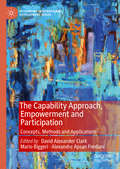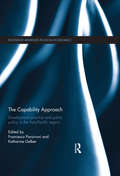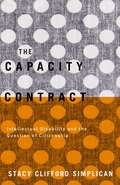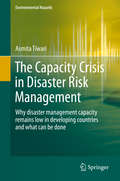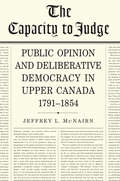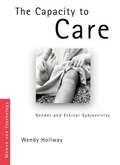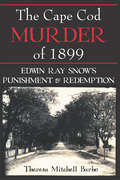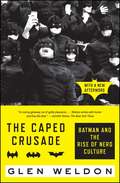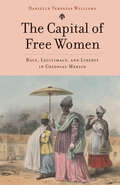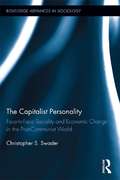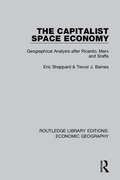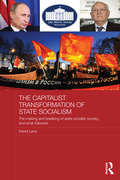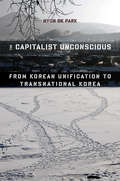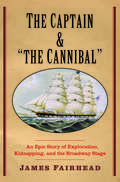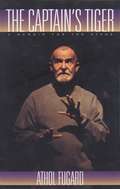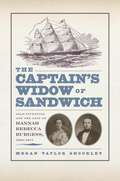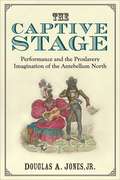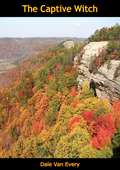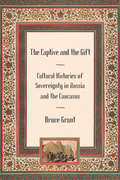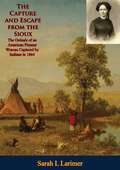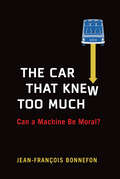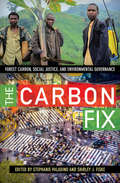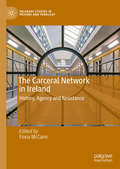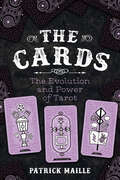- Table View
- List View
The Capability Approach, Empowerment and Participation: Concepts, Methods and Applications (Rethinking International Development series)
by Mario Biggeri David Alexander Clark Alexandre Apsan FredianiThis book explores the linkages between Amartya Sen’s Capability Approach and participatory forms of development – especially those associated with critical pedagogy and empowerment from the bottom-up. It shows how the capability approach and the participatory movement can complement and reinforce each other helping to ensure that democratic principles are respected and become the foundation for sustainable human development. The Capability Approach provides guiding principles for protecting the transformative roots of participation (safeguarding ownership, accountability and empowerment), while participation delivers vital methods for making the Capability Approach operational. Divided into three overlapping parts that focus on concepts, methods and applications, this work draws on diverse fieldwork experiences to unpack power relations, address adaptive preferences, explore individual and collective agency, consider new partnerships for development, and develop innovative concepts.
The Capability Approach: Development Practice and Public Policy in the Asia-Pacific Region (Routledge Advances in Social Economics #18)
by Francesca Panzironi Katharine GelberThis book provides a unique laboratory of ‘capabilities in practice’ in the Asia-Pacific region. It explores the application of the capability approach in development practice and public policy from a multidisciplinary perspective by bringing together scholars and practitioners from a wide range of disciplinary backgrounds, including development studies, health policy, political science, political theory, political economy, architecture, indigenous studies, urban planning and communication technologies. The first part of the book provides a foundational theoretical framework to introduce the empirical applications of the capability theory in different areas of development practice and public policy in the Asia-Pacific region. This part discusses thorny issues in capability theory and raises the potential for capability theory to lead to new ways of thinking about old problems. The second part discusses the application of the capability approach to intransigent problems of marginalisation and the articulation of public policy in New Zealand and Australia. In particular, this part focuses on the potential implications that a capability-based approach can have on the well-being of indigenous peoples in both countries, as well as children, older renters, and urban dwellers in Australia. The third part elucidates how capability theory is being applied by researchers in the Asia-Pacific region to local issues in developing countries such as Samoa, Vanuatu, Papua New Guinea and Sri Lanka. In doing so, it provides original content to the world market in capability theory by focussing on this often-neglected area of scholarship. As a whole, this volume offers a unique and innovative scrutiny of a multifaceted capability-based analysis of development practice and public policy. The scope and breadth of this volume advance the application of the capability approach and offer an indispensable resource to scholars, researchers, policy makers and policy practitioners interested in the theoretical insights and practical implications of the capability approach.
The Capacity Contract: Intellectual Disability and the Question of Citizenship
by Stacy Clifford SimplicanIn the first sustained examination of disability through the lens of political theory, The Capacity Contract shows how the exclusion of disabled people has shaped democratic politics. Stacy Clifford Simplican demonstrates how disability buttresses systems of domination based on race, sex, and gender. She exposes how democratic theory and politics have long blocked from political citizenship anyone whose cognitive capacity falls below a threshold level⎯marginalization with real-world repercussions on the implementation of disability rights today. Simplican&’s compelling ethnographic analysis of the self-advocacy movement describes the obstacles it faces. From the outside, the movement must confront stiff budget cuts and dwindling memberships; internally, self-advocates must find ways to demand political standing without reinforcing entrenched stigma against people with profound cognitive disabilities. And yet Simplican&’s investigation also offers democratic theorists and disability activists a more emancipatory vision of democracy as it relates to disability⎯one that focuses on enabling people to engage in public and spontaneous action to disrupt exclusion and stigma. Taking seriously democratic promises of equality and inclusion, The Capacity Contract rejects conceptions of political citizenship that privilege cognitive capacity and, instead, centers such citizenship on action that is accessible to all people.
The Capacity Crisis in Disaster Risk Management
by Asmita TiwariHow can a place be built and managed so that it is safe for people to live? Ironically, many governments and citizens keep on asking the same question after every new disaster. Why, even with high levels of investment in increasing government's capacity to manage disasters, do the impacts of disasters continue to increase? What can the governments do differently? What is the role of local communities? Where should aid agencies invest? This book looks into these critical questions and highlights how current capacity development efforts might be resulting in the opposite--capacity crisis or capability trap. The book provides a new approach for the understanding and the developing of effective local capacity to reduce and manage future disaster impacts.
The Capacity To Judge: Public Opinion and Deliberative Democracy in Upper Canada,1791-1854
by Jeffrey McnairnBy the mid-nineteenth-century, 'public opinion' emerged as a new form of authority in Upper Canada. Contemporaries came to believe that the best answer to common questions arose from deliberation among private individuals. Older conceptions of government, sociability and the relationship between knowledge and power were jettisoned for a new image of Upper Canada as a deliberative democracy. The Capacity to Judge asks what made widespread public debate about common issues possible; why it came to be seen as desirable, even essential; and how it was integrated into Upper Canada's constitutional and social self-image. Drawing on an international body of literature indebted to Jürgen Habermas and based on extensive research in period newspapers, Jeffrey L. McNairn argues that voluntary associations and the press created a reading public capable of reasoning on matters of state, and that the dynamics of political conflict invested that public with final authority. He traces how contemporaries grappled with the consequences as they scrutinized parliamentary, republican and radical options for institutionalizing public opinion. The Capacity to Judge concludes with a case study of deliberative democracy in action that serves as a sustained defense of the type of intellectual history the book as a whole exemplifies.
The Capacity to Care: Gender and Ethical Subjectivity (Women and Psychology)
by Wendy HollwayWendy Hollway explores a subject that is largely absent from the topical literature on care. Humans are not born with a capacity to care, and this volume explores how this capacity is achieved through the experiences of primary care, gender development and later, parenting. In this book, the author addresses the assumption that the capacity to care is innate. She argues that key processes in the early development of babies and young children create the capability for individuals to care, with a focus on the role of intersubjective experience and parent-child relations. The Capacity to Care also explores the controversial belief that women are better at caring than men and questions whether this is likely to change with contemporary shifts in parenting and gender relations. Similarly, the sensitive domain of the quality of care and how to consider whether care has broken down are also debated, alongside a consideration of what constitutes a ‘good enough’ family. The Capacity to Care provides a unique theorization of the nature of selfhood, drawing on developmental and object relations psychoanalysis, as well as philosophical and feminist literatures. It will be of relevance to social scientists studying gender development, gender relations and the family as well as those interested in the ethics of care debate.
The Cape Cod Murder of 1899: Edwin Ray Snow's Punishment & Redemption (True Crime Ser.)
by Theresa Mitchell BarboThe story of a teenage thief who became a killer—and how prison transformed him—in turn-of-the-century New England. On a crisp September evening in 1899, a seventeen-year-old petty thief named Edwin Ray Snow shot and killed a bakery deliveryman named Jimmy Whittemore outside Yarmouth, Massachusetts. The gunshots rang out for only a moment, but the effects resounded on Cape Cod for half a century. The idyllic atmosphere of turn-of-the-century Cape Cod was shattered in a flash. Soon after the crime, Snow pleaded guilty to murder in the first degree, and was the first person ever to be sentenced to death by electric chair in the state&’s history. But his compelling story didn&’t end there, and his redemption—earned through decades of hard time—was as dramatic and uplifting as his crime was heinous. Drawing upon town records, historical documents, correspondence and newspapers of the day, The Cape Cod Murder of 1899 recreates the towns of Dennis and Yarmouth at the turn of the century and examines the details of a murder that shook Cape Cod to its core.
The Caped Crusade: Batman and the Rise of Nerd Culture
by Glen WeldonA witty, intelligent cultural history from NPR book critic Glen Weldon explains Batman's rises and falls throughout the ages--and what his story tells us about ourselves.Since his creation, Batman has been many things: a two-fisted detective; a planet-hopping gadabout; a campy Pop-art sensation; a pointy-eared master spy; and a grim and gritty ninja of the urban night. For more than three quarters of a century, he has cycled from a figure of darkness to one of lightness and back again; he's a bat-shaped Rorschach inkblot who takes on the various meanings our changing culture projects onto him. How we perceive Batman's character, whether he's delivering dire threats in a raspy Christian Bale growl or trading blithely homoerotic double-entendres with partner Robin on the comics page, speaks to who we are and how we wish to be seen by the world. It's this endlessly mutable quality that has made him so enduring. And it's Batman's fundamental nerdiness--his gadgets, his obsession, his oath, even his lack of superpowers--that uniquely resonates with his fans who feel a fiercely protective love for the character. Today, fueled by the internet, that breed of passion for elements of popular culture is everywhere. Which is what makes Batman the perfect lens through which to understand geek culture, its current popularity, and social significance. In The Caped Crusade, with humor and insight, Glen Weldon, book critic for NPR and author of Superman: The Unauthorized Biography, lays out Batman's seventy-eight-year cultural history and shows how he has helped make us who we are today and why his legacy remains so strong.
The Capital of Free Women: Race, Legitimacy, and Liberty in Colonial Mexico
by Danielle Terrazas WilliamsA restoration of the agency and influence of free African-descended women in colonial Mexico through their traces in archives “A breathtaking study that places free African-descended women at the nexus of questions about religion, commerce, and the law in colonial Mexico. Danielle Terrazas Williams has produced a dazzling and important contribution to the history of women, family, race, and slavery in the Americas.”—Sophie White, author of Voices of the Enslaved The Capital of Free Women examines how African-descended women strove for dignity in seventeenth-century Mexico. Free women in central Veracruz, sometimes just one generation removed from slavery, purchased land, ran businesses, managed intergenerational wealth, and owned slaves of African descent. Drawing from archives in Mexico, Spain, and Italy, Danielle Terrazas Williams explores the lives of African-descended women across the economic spectrum, evaluates their elite sensibilities, and challenges notions of race and class in the colonial period.
The Capitalist Personality: Face-to-Face Sociality and Economic Change in the Post-Communist World (Routledge Advances in Sociology #86)
by Christopher S. SwaderModern capitalism favors values that undermine our face-to-face bonds with friends and family members. Focusing on the post-communist world, and comparing it to more "developed" societies, this book reveals the mixed effects of capitalist culture on interpersonal relationships. While most observers blame the egoism and asocial behavior found in new free-market societies on their communist pasts, this work shows how relationships are also threatened by the profit orientations and personal ambition unleashed by economic development. Successful people in societies as diverse as China, Russia, and Eastern Germany adjust to the market economy at a social cost, relaxing their morals in order to obtain success and succumbing to increased material temptations to exploit relationships for their own financial and professional gain. The capitalist personality is internally troubled as a result of this "sellout," but these qualms subside as it devalues intimate qualitative bonds with others. This book also shows that post-communists are similarly individualized as people living in Western societies. Capitalism may indeed favor values of independence, creativity, and self-expressiveness, but it also rewards self-centeredness, consumerism, and the stripping down of morality. As is the case in the West, capitalist culture fosters an internally conflicted and self-centered personality in post-communist societies.
The Capitalist Space Economy: Geographical Analysis after Ricardo, Marx and Sraffa (Routledge Library Editions: Economic Geography)
by Eric Sheppard Trevor BarnesRepresenting an innovative approach to the analysis of the economic geography of capitalism, this stimulating book develops an analytical political economic framework. Part 1 provides an introductory overvi9ew fo some of the fundamental debates about price, profits and value in economics which underlie the analytical political economy approach. Part 2 analyzes the special role of space and transportation in commodity production and the spatial organization of the economy that this implies. Parts 3 and 4 examine the conflicting goals and actions of different social clases and individuals and how these are complicated by space, concluding with a detailed analysis of capitalists’ strategiesas they cope with uncertainty and disequilibrium.
The Capitalist Transformation of State Socialism: The Making and Breaking of State Socialist Society, and What Followed (BASEES/Routledge Series on Russian and East European Studies)
by David LaneDavid Lane outlines succinctly yet comprehensively the development and transformation of state socialism. While focussing on Russia and the countries of Eastern Europe, he also engages in a discussion of the Chinese path. In response to the changing social structure and external demands, he outlines different scenarios of reform. He contends that European state socialism did not collapse but was consciously dismantled. He brings out the West’s decisive support of the reform process and Gorbachev’s significant role in tipping the balance of political forces in favour of an emergent ascendant class. In the post-socialist period, he details developments in the economy and politics. He distinguishes different political and economic trajectories of countries of the former USSR, the New Member States of the European Union, and China; and he notes the attempts to promote further change through ‘coloured’ revolutions. The book provides a detailed account not only of the unequal impact of transformation on social inequality which has given rise to a privileged business and political class, but also how far the changes have fulfilled the promise of democracy promotion, wealth creation and human development. Finally, in the context of globalisation, the author considers possible future political and economic developments for Russia and China. Throughout the author, a leading expert in the field, brings to bear his deep knowledge of socialist countries, draws on his research on the former Soviet Union, and visits to nearly all the former state socialist countries, including China.
The Capitalist Unconscious: From Korean Unification to Transnational Korea
by Hyun Ok ParkThe unification of North and South Korea is widely considered an unresolved and volatile matter for the global order, but this book argues capital has already unified Korea in a transnational form. As Hyun Ok Park demonstrates, rather than territorial integration and family union, the capitalist unconscious drives the current unification, imagining the capitalist integration of the Korean peninsula and the Korean diaspora as a new democratic moment.Based on extensive archival and ethnographic research in South Korea and China, The Capitalist Unconscious shows how the hegemonic democratic politics of the post-Cold War era (reparation, peace, and human rights) have consigned the rights of migrant laborers—protagonists of transnational Korea—to identity politics, constitutionalism, and cosmopolitanism. Park reveals the riveting capitalist logic of these politics, which underpins legal and policy debates, social activism, and media spectacle. While rethinking the historical trajectory of Cold War industrialism and its subsequent liberal path, this book also probes memories of such key events as the North Korean and Chinese revolutions, which are integral to migrants' reckoning with capitalist allures and communal possibilities. Casting capitalist democracy within an innovative framework of historical repetition, Park elucidates the form and content of the capitalist unconscious at different historical moments and dissolves the modern opposition among socialism, democracy, and dictatorship. The Capitalist Unconscious astutely explores the neoliberal present's past and introduces a compelling approach to the question of history and contemporaneity.
The Captain and "the Cannibal"
by James FairheadSailing the uncharted waters of the Pacific in 1830, Captain Benjamin Morrell of Connecticut became the first outsider to encounter the inhabitants of a small island off New Guinea. The contact quickly turned violent, fatal cannons were fired, and Morrell abducted young Dako, a hostage so shocked by the white complexions of his kidnappers that he believed he had been captured by the dead. This gripping book unveils for the first time the strange odyssey the two men shared in ensuing years. The account is uniquely told, as much from the captive's perspective as from the American's. Upon returning to New York, Morrell exhibited Dako as a "cannibal" in wildly popular shows performed on Broadway and along the east coast. The proceeds helped fund a return voyage to the South Pacific--the captain hoping to establish trade with Dako's assistance, and Dako seizing his only chance to return home to his unmapped island. Supported by rich, newly found archives, this wide-ranging volume traces the voyage to its extraordinary ends and en route decrypts Morrell's ambiguous character, the mythic qualities of Dako's life, and the two men's infusion into American literature--Dako inspired Melville's Queequeg, for example. The encounters confound indigenous peoples and Americans alike as both puzzle over what it is to be truly human and alive.
The Captain's Tiger
by Athol FugardWorld renowned South African playwright Athol Fugard recreates the world of his youth in his newest play, based on his experiences aboard a tramp steamer. This critically acclaimed drama has already had productions in Los Angeles, Washington D.C., Princeton N.J., and at the Spoleto Festival in South Carolina. The New York premiere is schedules for January 1999, staring Mr. Fugard.
The Captain’s Widow of Sandwich: Self-Invention and the Life of Hannah Rebecca Burgess, 1834-1917
by Megan Taylor ShockleyIn 1852 Hannah Rebecca Crowell married sea captain William Burgess and set sail. Within three years, Rebecca Burgess had crossed the equator eleven times and learned to navigate a vessel. In 1856, 22-year-old Rebecca saved the ship Challenger as her husband lay dying from dysentery. The widow returned to her family’s home in Sandwich, Massachusetts, where she refused all marriage proposals and died wealthy in 1917.This is the way Burgess recorded her story in her prodigious journals and registers, which she donated to the local historical society upon her death, but there is no other evidence that this dramatic event occurred exactly this way. In The Captain’s Widow of Sandwich, Megan Taylor Shockley examines how Burgess constructed her own legend and how the town of Sandwich embraced that history as its own. Through careful analysis of myriad primary sources, Shockley also addresses how Burgess dealt with the conflicting gender roles of her life, reconciling her traditionally masculine adventures at sea and her independent lifestyle with the accepted ideals of the period’s “Victorian woman.”
The Captive Stage: Performance And The Proslavery Imagination Of The Antebellum North
by Douglas A. JonesIn The Captive Stage, Douglas A. Jones, Jr. argues that proslavery ideology remained the dominant mode of racial thought in the antebellum north, even though chattel slavery had virtually disappeared from the region by the turn of the nineteenth century--and that northerners cultivated their proslavery imagination most forcefully in their performance practices. Jones explores how multiple constituencies, ranging from early national artisans and Jacksonian wage laborers to patrician elites and bourgeois social reformers, used the stage to appropriate and refashion defenses of black bondage as means to affirm their varying and often conflicting economic, political, and social objectives. Joining performance studies with literary criticism and cultural theory, he uncovers the proslavery conceptions animating a wide array of performance texts and practices, such as the "Bobalition" series of broadsides, blackface minstrelsy, stagings of the American Revolution, reform melodrama, and abolitionist discourse. Taken together, he suggests, these works did not amount to a call for the re-enslavement of African Americans but, rather, justifications for everyday and state-sanctioned racial inequities in their post-slavery society. Throughout, The Captive Stage elucidates how the proslavery imagination of the free north emerged in direct opposition to the inclusionary claims black publics enacted in their own performance cultures. In doing so, the book offers fresh contexts and readings of several forms of black cultural production, including early black nationalist parades, slave dance, the historiography of the revolutionary era, the oratory of radical abolitionists and the black convention movement, and the autobiographical and dramatic work of ex-slave William Wells Brown.
The Captive Wife (Routledge Classics)
by Hannah GavronIn 1965, at the age of twenty-nine, the young sociologist Hannah Gavron took her own life. A year later, the book based on the research she carried out for her thesis was published as The Captive Wife. Based on first-hand accounts of the lives of working-class and middle-class women in Kentish Town in London, it was one of the earliest works of British, sociological feminism and has since become a feminist classic.Arguing that motherhood stripped women of independence as it often brought an end to paid work, Gavron explores how their values and aspirations as women came into conflict with the traditional role they had to play as mothers.Written in simple prose and fair-minded in its approach, it became an inspirational book for many mothers, feminists and activists seeking equality for women and remains a vital book today.This Routledge Classics edition includes a new Foreword by Ann Oakley.
The Captive Witch
by Dale Van EveryDale Van Every’s soaring adventure saga of the untamed Kentucky wilderness, a savage woman and the young frontiersman who set out to conquer them both…They weathered the brutal winter of ‘79 in an isolated cave deep in the Kentucky wilderness: Adam Frane, backwoodsman, rifleman, soldier; and Nita, the proud, passionate woman who had rejected her civilized past for the life of a Cherokee squaw. They shred that cruel season knowing that, when the thaws came, Adam would return to Trace’s Landing and to Cynthia, the faithful young widow who waited for him there; knowing, too, that Nita would try to keep him—with all the savage passion that had earned her the name…One of Dale Van Every’s most exciting historical novels…filled with the raw emotions and rich adventures of America’s untamed past…“Fascinating, vivid, real!”—The New York Times
The Captive and the Gift: Cultural Histories of Sovereignty in Russia and the Caucasus
by Bruce GrantThe Caucasus region of Eurasia, wedged in between the Black and Caspian Seas, encompasses the modern territories of Armenia, Azerbaijan, and Georgia, as well as the troubled republic of Chechnya in southern Russia. A site of invasion, conquest, and resistance since the onset of historical record, it has earned a reputation for fearsome violence and isolated mountain redoubts closed to outsiders. Over extended efforts to control the Caucasus area, Russians have long mythologized stories of their countrymen taken captive by bands of mountain brigands. In The Captive and the Gift, the anthropologist Bruce Grant explores the long relationship between Russia and the Caucasus and the means by which sovereignty has been exercised in this contested area. Taking his lead from Aleksandr Pushkin's 1822 poem "Prisoner of the Caucasus," Grant explores the extraordinary resonances of the themes of violence, captivity, and empire in the Caucasus through mythology, poetry, short stories, ballet, opera, and film. Grant argues that while the recurring Russian captivity narrative reflected a wide range of political positions, it most often and compellingly suggested a vision of Caucasus peoples as thankless, lawless subjects of empire who were unwilling to acknowledge and accept the gifts of civilization and protection extended by Russian leaders. Drawing on years of field and archival research, Grant moves beyond myth and mass culture to suggest how real-life Caucasus practices of exchange, by contrast, aimed to control and diminish rather than unleash and increase violence. The result is a historical anthropology of sovereign forms that underscores how enduring popular narratives and close readings of ritual practices can shed light on the management of pluralism in long-fraught world areas.
The Capture and Escape from the Sioux: The Ordeals of an American Pioneer Woman Captured by Indians in 1864
by Sarah L Larimer“A famous account of abduction and escape from hostile Indians in the old West.In July, 1864 hostile Oglala Sioux Indians attacked the wagon train of the pioneering Kelly and Larimer families approximately 80 miles west of Fort Laramie, Wyoming. Several people were killed or wounded but Sarah Larimer and Fanny Kelly, together with some of their children, were taken into captivity by the Indians. On the second night of their captivity Sarah Larimer and her son managed to escape from the Indian camp and after many difficulties and privations they reached the Deer Creek telegraph station and safety. This book is Sarah Larimer’s story of her ordeal. Fanny Kelly’s captivity with the Sioux lasted longer and on her release she also wrote a book about her experiences. She also sued Sarah Larimer over her memoir and several trials took place over ten years before the matter was settled. [This Book] provides fascinating insights into the westward passage of pioneer families in North America, and those interested in the Indian tribes of the Great Plains during their struggle to maintain their traditional way of life will also find much to interest them in the pages of these books.”-Print ed.
The Car That Knew Too Much: Can a Machine Be Moral?
by Jean-Francois BonnefonThe inside story of the groundbreaking experiment that captured what people think about the life-and-death dilemmas posed by driverless cars.Human drivers don't find themselves facing such moral dilemmas as "should I sacrifice myself by driving off a cliff if that could save the life of a little girl on the road?" Human brains aren't fast enough to make that kind of calculation; the car is over the cliff in a nanosecond. A self-driving car, on the other hand, can compute fast enough to make such a decision--to do whatever humans have programmed it to do. But what should that be? This book investigates how people want driverless cars to decide matters of life and death. In The Car That Knew Too Much, psychologist Jean-François Bonnefon reports on a groundbreaking experiment that captured what people think cars should do in situations where not everyone can be saved. Sacrifice the passengers for pedestrians? Save children rather than adults? Kill one person so many can live? Bonnefon and his collaborators Iyad Rahwan and Azim Shariff designed the largest experiment in moral psychology ever: the Moral Machine, an interactive website that has allowed people --eventually, millions of them, from 233 countries and territories--to make choices within detailed accident scenarios. Bonnefon discusses the responses (reporting, among other things, that babies, children, and pregnant women were most likely to be saved), the media frenzy over news of the experiment, and scholarly responses to it. Boosters for driverless cars argue that they will be in fewer accidents than human-driven cars. It's up to humans to decide how many fatal accidents we will allow these cars to have.
The Carbon Fix: Forest Carbon, Social Justice, and Environmental Governance
by Stephanie Paladino Shirley J FiskeGiven the growing urgency to develop global responses to a changing climate, The Carbon Fix examines the social and equity dimensions of putting the world’s forests—and, necessarily, the rural people who manage and depend on them—at the center of climate policy efforts such as REDD+, intended to slow global warming. The book assesses the implications of international policy approaches that focus on forests as carbon and especially, forest carbon offsets, for rights, justice, and climate governance. Contributions from leading anthropologists and geographers analyze a growing trend towards market principles and financialization of nature in environmental governance, placing it into conceptual, critical, and historical context. The book then challenges perceptions of forest carbon initiatives through in-depth, field-based case studies assessing projects, policies, and procedures at various scales, from informed consent to international carbon auditing. While providing a mixed assessment of the potential for forest carbon initiatives to balance carbon with social goals, the authors present compelling evidence for the complexities of the carbon offset enterprise, fraught with competing interests and interpretations at multiple scales, and having unanticipated and often deleterious effects on the resources and rights of the world’s poorest peoples—especially indigenous and rural peoples. The Carbon Fix provides nuanced insights into political, economic, and ethical issues associated with climate change policy. Its case approach and fresh perspective are critical to environmental professionals, development planners, and project managers; and to students in upper level undergraduate and graduate courses in environmental anthropology and geography, environmental and policy studies, international development, and indigenous studies.
The Carceral Network in Ireland: History, Agency and Resistance (Palgrave Studies in Prisons and Penology)
by Fiona McCannThis book examines the forms and practices of Irish confinement from the 19th century to present-day to explore the social and political failings of 20th and 21st century postcolonial Ireland. Building on an interdisciplinary conference held in the Crumlin Road Gaol, Belfast, the methodological approaches adopted across this book range from the historical and archival to the sociological, political, and literary. This edited collection touches on topics such as industrial schools, Magdalen laundries, struggles and resistance in prisons both North and South, Direct Provision, and the ways in which prison experiences have been represented in literature, cinema, and the arts. It sketches out an uncomfortable picture of the techniques for policing bodies deployed in Ireland for over a century. This innovative study seeks to establish a link between Ireland’s inhumane treatment of women and children, of prisoners, and of asylum seekers today, and to expose and pinpoint modes of resistance to these situations.
The Cards: The Evolution and Power of Tarot
by Patrick MailleTarot cards have been around since the Renaissance and have become increasingly popular in recent years, often due to their prevalence in popular culture. While Tarot means many different things to many different people, the cards somehow strike universal chords that can resonate through popular culture in the contexts of art, television, movies, even comic books. The symbolism within the cards, and the cards as symbols themselves, make Tarot an excellent device for the media of popular culture in numerous ways. They make horror movies scarier. They make paintings more provocative. They provide illustrative structure to comics and can establish the traits of television characters. The Cards: The Evolution and Power of Tarot begins with an extensive review of the history of Tarot from its roots as a game to its supposed connection to ancient Egyptian magic, through its place in secret societies, and to its current use in meditation and psychology. This section ends with an examination of the people who make up today’s tarot community. Then, specific areas of popular culture—art, television, movies, and comics—are each given a chapter in which to survey the use of Tarot. In this section, author Patrick Maille analyzes such works as Deadpool, Books of Magic by Neil Gaiman, Disney's Haunted Mansion, Sherlock Holmes: Game of Shadows, The Andy Griffith Show, Buffy the Vampire Slayer, and King of the Hill. The cards are evocative images in their own right, but the mystical fascination they inspire makes them a fantastic tool to be used in our favorite shows and stories.
